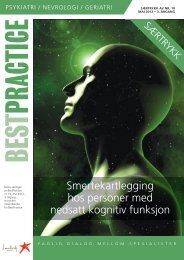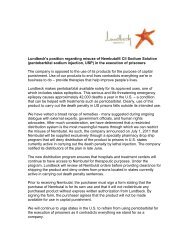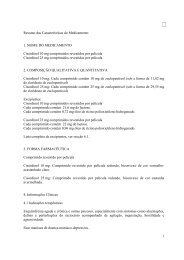Download - Lundbeck
Download - Lundbeck
Download - Lundbeck
You also want an ePaper? Increase the reach of your titles
YUMPU automatically turns print PDFs into web optimized ePapers that Google loves.
16 <strong>Lundbeck</strong> Magazine 2009<br />
Close to<br />
her heart<br />
The ratio of elderly persons in China is rising rapidly, and 30<br />
years from now the country will have as many persons with<br />
dementia as in the entire rest of the developed world.<br />
Professor Zhang Zhen-Xin is one of China’s<br />
leading neurologists who specialize in<br />
Alzheimer’s and Parkinson’s disease. As a<br />
professor at Beijing Union Medical College<br />
Hospital, she has studied Alzheimer’s untiringly<br />
for more than 40 years. She feels that it is her<br />
responsibility to increase knowledge and<br />
awareness of the disease as well as the<br />
treatment for it. Because Professor Zhang is<br />
convinced that treating Alzheimer’s is<br />
definitely worth while.<br />
“I have patients who have been treated for<br />
more than 10 years, and who with the aid of<br />
medicine can still communicate and perform<br />
daily tasks when they have the right help,”<br />
Zhang Zhen-Xin says. As adviser to the Chinese<br />
health authority SFDA, she is also one of the<br />
leading experts in the newly-established<br />
<strong>Lundbeck</strong> Institute in China.<br />
“China has a rapidly aging population. Thirty<br />
years from now, the country will have just as<br />
many persons with dementia as there are in<br />
the entire rest of the developed world. Our<br />
government is aware of the problem, which is<br />
sometimes referred to as a ticking bomb,” says<br />
Professor Zhang.<br />
“Parkinson’s has been in focus for some time,”<br />
she adds, “because several of our political<br />
leaders – including Deng Xiao-Ping – had the<br />
disease. But it was commonly thought that the<br />
incidence of Alzheimer’s was significantly<br />
lower in China than in the rest of the world.”<br />
5.8 per cent have Alzheimer’s<br />
Zhang Zhen-Xin helped disprove the myth<br />
when she headed an epidemiological study of<br />
the incidence of dementia in a number of<br />
cities and rural areas in China. The study, which<br />
took six years and included 40,000 persons, is<br />
one of the most comprehensive in the world,<br />
and clearly showed that the incidence of<br />
dementia in China is on a par with that in the<br />
rest of the world’s population. The study shows<br />
that 5.8 per cent of the population above the<br />
age of 65 develop Alzheimer’s.<br />
“Dementia and Alzheimer’s used to be<br />
considered a natural result of old age. And<br />
even now, very few are diagnosed or treated<br />
for the disease by a doctor. This is changing,<br />
however. Especially in wealthy cities such as<br />
Shanghai, the ratio of persons who seek<br />
treatment is on the rise. And this despite the<br />
fact that most people have to pay every yuan<br />
themselves. There is no government<br />
reimbursement for medication for dementia.”<br />
China has a long tradition in herbal medicine.<br />
And while professor Zhang does not dismiss<br />
traditional medicine across the board, she does<br />
believe it is often fraudulent when elderly<br />
persons pay thousands of yuan for a small<br />
amount of herbal medicine. And she<br />
underscores the fact that most Chinese<br />
consumers now prefer Western<br />
pharmaceuticals, of whose efficacy has been<br />
scientifically established.<br />
Sons care for their parents<br />
Zhang Zhen-Xin spent time in rural areas<br />
where she literally went from bed to bed<br />
visiting patients during the course of one of<br />
her studies in the late 1990s.<br />
“Conditions were often deplorable. In China,<br />
the sons traditionally care for their parents. If<br />
there are several sons, they care for their<br />
parents in turn. Especially in poor rural areas,<br />
however, there is little sympathy for persons<br />
with dementia, and they risk being turned out<br />
if caring for them becomes too difficult.<br />
Persons with dementia often die within a few<br />
years due to malnutrition, pneumonia and<br />
poor care.”<br />
“This situation has improved, especially among<br />
well-educated people in the cities – first and<br />
foremost due to the improved economy. The<br />
PHOTO: Simon ladefoged



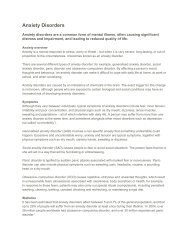


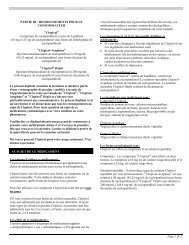
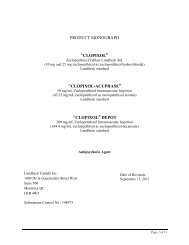
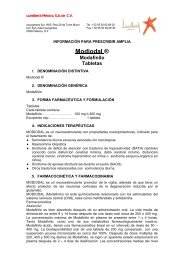
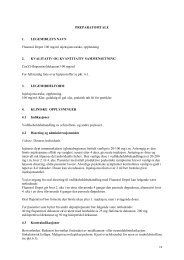
![[Product Monograph Template - Standard] - Lundbeck](https://img.yumpu.com/49015733/1/190x245/product-monograph-template-standard-lundbeck.jpg?quality=85)
